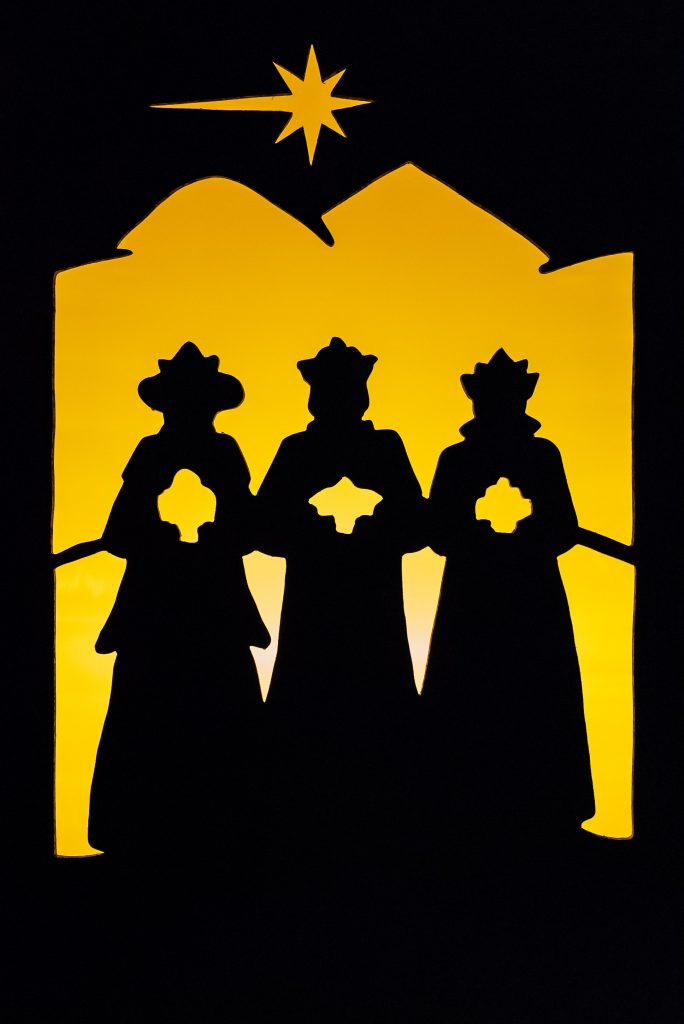Note: This week and next week I have the privilege of sharing some scripture and life reflections with my church community via our weekly newsletter. I’ve been asked to reflect on the theme of epiphany – what do I feel like God is revealing to me, and what do I do with that? I wanted to share these reflections with you, too. Here’s the first.

On New Year’s Day, Pastor Lina preached on the Epiphany story (Matthew 2:1-12). She reflected on the ways God speaks to and through people whom Christians might consider religious “outsiders,” like the magi in the story. God’s wisdom and love is bigger than we often imagine.
As I reflect on the Epiphany story, I notice how the magi set out to worship “the one who has been born king” (Matt 2:2). They talk about birth, so it sounds like they knew he was still a baby. And yet, what must it have been like to actually get there and see that this was the king they came to worship (v. 11)? He was just a tiny infant. Maybe sleeping, maybe crying, maybe breastfeeding.
What did that feel like? What did it do to the magi’s ideas of kingliness—and, more generally, to their ideas about power, and wisdom, and who does or doesn’t have these things?
I used to work in college campus ministry, and I’ve done a lot of listening to people younger than myself—trying to encourage them, root for them, cultivate loving spaces where they can grow and thrive. But sometimes I catch myself assuming I know better than them. Of course I do—I remember how little I knew at their age.
And yet. Wisdom comes through God’s Spirit, who dwells in people of all ages. There is also wisdom that comes from life experience, and older people often have more of this. But people younger than me have had life experiences different from my own, and they have gained wisdom from these experiences. I want to pay attention to that.
In the First Nations Version, the magi say, “We saw [Messiah’s] star where the sun rises and have come to humble ourselves before him and honor him” (v. 2). This translation uses the words “humble” and “honor” where other translations often say “worship.” I like this.
I don’t want to worship people younger than me. But I do want to humble myself and honor them. I don’t want to assume I have nothing to learn.
Dominant U.S. society has norms around who has power, who is expected to lead, who is assumed to have expertise and wisdom, who is followed and heard: white, male, straight, able-bodied, upper-middle-class, ages 35-70.
There is no part of me that truly believes these things are qualifications for leadership. And yet, these subliminal expectations are deeply ingrained in me, and in many of us. Operating otherwise feels like swimming upstream. But this is what God invites us to do.
What to do with this? For me, I think humbling myself and honoring young(er) folks means choosing not to take a piece of writing, a spoken word, a poem, a piece of art, or anything else less seriously when it was written, spoken, or created by someone younger than me. It means listening to people younger than myself not just to support them but also to see what I can learn from them. It means hearing their words of dissent, dissatisfaction, or critique with openness rather than defensiveness.
Humility and honor: this is what we have to offer one another as humans. Across ages, across generations, across race and class and gender and orientation and all the other differences that often divide us. My hope is that a posture of humility and honor comes to mark both my life and our life together as a community.
Peace to you this week.
Liz